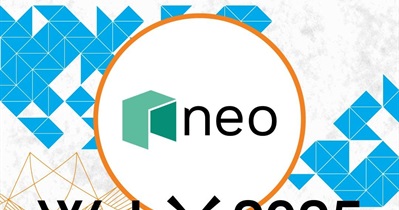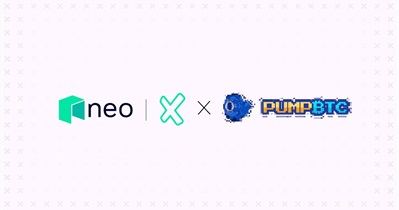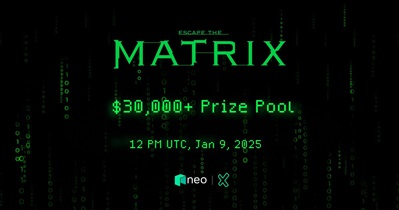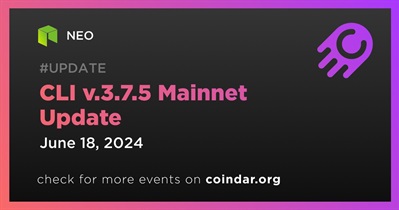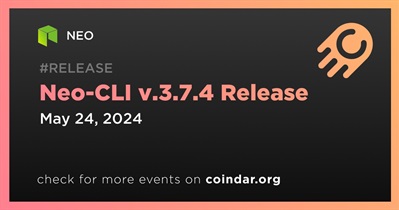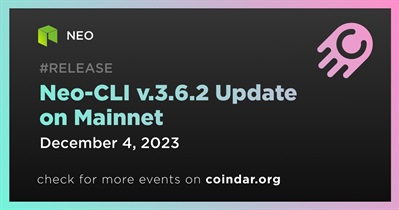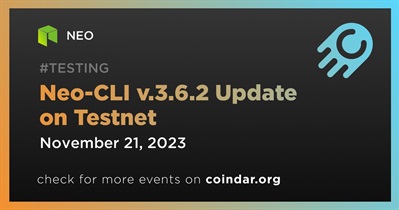NEO Feed: Events, News & Roadmap
NEO to Participate in WebX2025 in Tokyo on August 25th
NEO will attend the WebX2025 conference in Tokyo, which is scheduled for August 25th-26th, with its representatives located at booth G-2.
NEO Partners With Chain GPT
Neo has announced a partnership with ChainGPT to integrate AI-powered developer tools, smart contract generation, and other intelligent features into the Neo ecosystem.
Neo to Shutdown Legacy Mainnet on October 31st
Neo has issued an official reminder that the Neo Legacy MainNet will be shut down on October 31.
NEO to Participate in Consensus2025 in Toronto on May 14th
NEO will participate in the Consensus2025 conference scheduled to open on May 14th-16th.
NEO to Hold AMA on Discord on April 30th
NEO co-founder Da Hongfei will conduct an AMA on Discord at 06:00 UTC on April 30th.
NEO Partners With PumpBTC
NEO has partnered with PumpBTC to usher in a new era of Bitcoin Finance innovation.
NEO to Release Escape the Matrix on January 9th
NEO is set to launch its first experimental AI Agent product, “Escape the Matrix”, on Neo X on January 9 at 12:00 PM UTC.
NEO to Extend Hackathon Submissions
NEO has extended the submission deadline for the Neo X Grind hackathon to December 30, 2024.
NEO to Participate in Binance Blockchain Week in Dubai
NEO will participate in Binance Blockchain Week in Dubai on October 30th-31st.
NEO to Be Integrated With OwlX.ai
NEO has been integrated into OwlX.ai’s AI-powered media aggregator. This integration allows users to track and explore a variety of Web3 projects.
NEO to Hold AMA on X on June 21st
NEO will host an AMA on X with Neo ecosystem members on the latest developments in Web3 gaming. The session will take place on June 21st at 10:00 UTC.
NEO to Release CLI v.3.7.5 Mainnet Update on June 18th
NEO has announced that the Neo-CLI v.3.7.5 update, which was previously applied to the Neo N3 T5 testnet on June 13th, will be applied to the mainnet on June 18th.
NEO to Release Neo-CLI v.3.7.4 on May 24th
NEO has announced that the Neo-CLI v.3.7.4 update was successfully implemented on the T5 testnet on May 17th.
NEO Partners With OORT
NEO has entered into a partnership with OORT. The collaboration will initially focus on supporting the Neo X sidechain.
NEO to Upgrade Neo-CLI v.3.6.2 Mainnet on December 4th
NEO will release Neo-CLI v.3.6.2 on mainnet on December 4th.
NEO to Upgrade Neo-CLI v.3.6.2 on Testnet on November 21st
NEO will release Neo-CLI v.3.6.2 on testnet on November 21st.
NEO to Hold AMA on X on November 20th
NEO will host an AMA on X on November 20th at 10:00 UTC. The discussion will focus on the innovative ideas emerging from the NEO community.
NEO to Organize Neo Community Assembly
To celebrate the 7th anniversary of the mainnet, NEO will be holding a “Neo Community Assembly” event.
NEO to Hold HK Web3 Evolution in Hong Kong
NEO is set to host HK Web3 Evolution during the finale of the Neo APAC hackathon at CyberPort, Hong Kong on October 27-28.
NEO and AlienSwap to Launch Token2049 Adventure NFT on September 8th
NEO is set to launch the Token2049 Adventure NFT in collaboration with AlienSwap NFT marketplace. The launch is scheduled on September 8th at 16:00 UTC.
NEO Events on the Chart
What is NEO?
NEO is a blockchain platform and cryptocurrency designed to build a scalable network of decentralized applications. The base asset of the NEO blockchain is the non-divisible NEO token, which generates GAS tokens. These GAS tokens, which are divisible, can be used to pay for transaction fees to utilize the network. The NEO blockchain is often referred to as China's response to Ethereum because of its similar use of smart contracts.
NEO was founded in 2014 by Da Hongfei and Erik Zhang under the name AntShares, which later rebranded to NEO in June 2017. It supports common programming languages like JavaScript and Python, which means developers can develop smart contracts without learning a unique language, unlike Ethereum which requires learning its proprietary language, Solidity. This feature was created to attract a broader developer audience to build on their platform.
One of the major differences between NEO and other smart contract-enabled blockchains is its consensus mechanism. Rather than using proof-of-work or proof-of-stake, NEO uses a protocol known as delegated Byzantine Fault Tolerance (dBFT). This consensus protocol is designed to provide a system that can efficiently reach consensus without requiring intensive energy use, and it also supports up to 10,000 transactions per second (TPS).
NEO also implements a digital identity protocol to enable the creation of identity information of organizations, individuals, and entities in electronic form. These identities are usable via multi-factor authentication mechanisms such as facial recognition, fingerprints, voice recognition, and SMS.
In conclusion, NEO aims to automate the management of digital assets through the use of smart contracts and to create a "smart economy" with a distributed network. It's an ambitious project that has drawn attention from both China and the international community for its potential to transform various industries, from finance to supply chain management and more.




